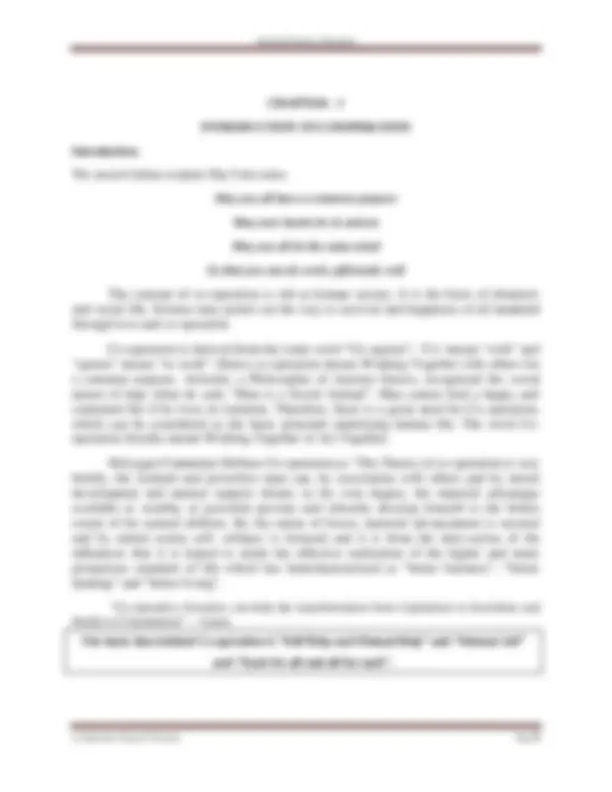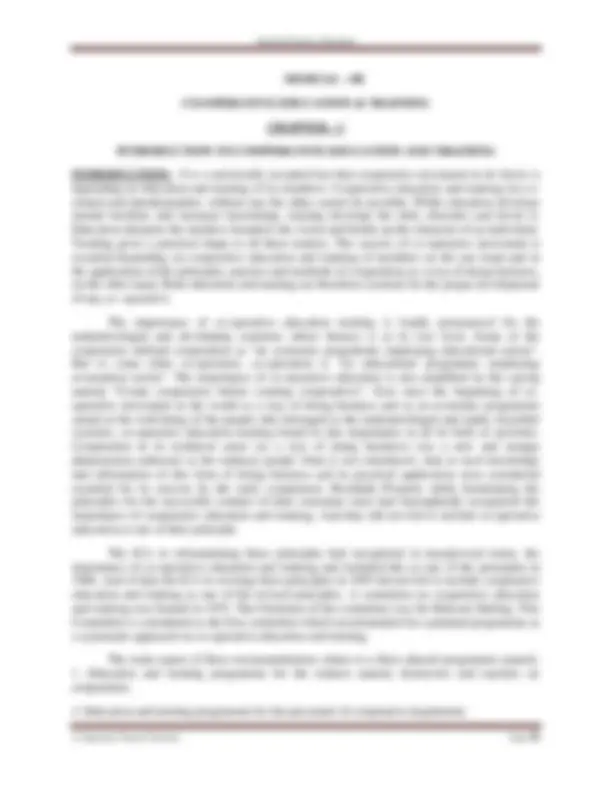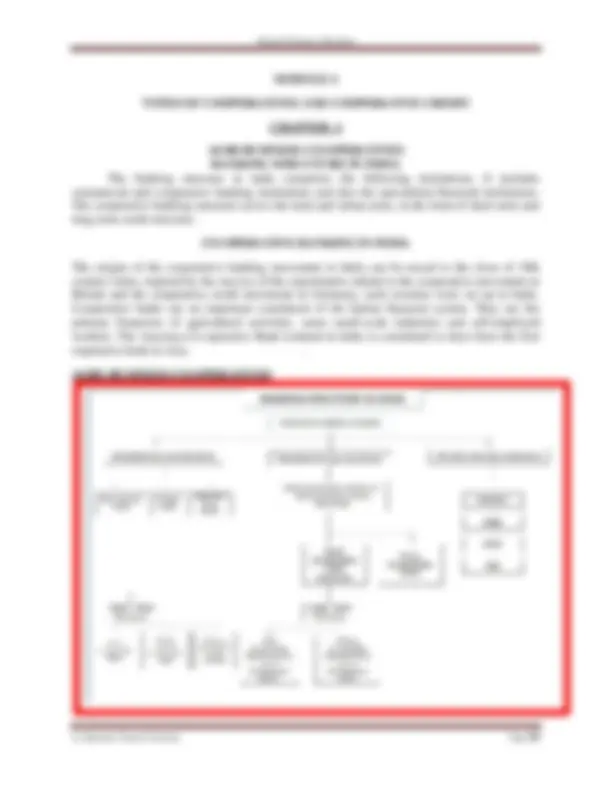Download CO-OPERATION IN INDIA and more Exams Business Systems in PDF only on Docsity!
CO-OPERATIVE
THEORY AND PRACTICE
Core course of
BCom –
V semester
(Co-operation specialization) –
CUCBCSS
2014 Admn onwards
CALICUT UNIVERSITY
SCHOOL OF DISTANCE EDUCATION
Calicut University P.O. 673635
339 A
CALICUT UNIVERSITY
SCHOOL OF DISTANCE EDUCATION
Study Material Core course of BCom – V semester (Co-operation specialization) – CUCBCSS 2014 Admn onwards Prepared By: PRADEESH.K ASSISTANT PROFESSOR OF COMMERCE GOVERNMENT COLLEGE CHITTUR, PALAKKAD Settings & Lay Out By SDE,Computer Cell
CHAPTER – 1
INTRODUCTION TO COOPERATION
Introduction The ancient Indian scripture Rig Veda states; May you all have a common purpose May your hearts be in unison May you all be the same mind So that you can do work, efficiently well
The concept of co-operation is old as human society. It is the basis of domestic
and social life. Science may points out the way to survival and happiness of all mankind
through love and co-operation
Co-operation is derived from the Latin word “Co-operari”, ‘Co’ means “with” and
‘operari’ means “to work”. Hence co-operation means Working Together with others for
a common purpose. Aristotle, a Philosopher of Ancient Greece, recognized the social
nature of man when he said, “Man is a Social Animal”. Man cannot lead a happy and
contented life if he lives in isolation. Therefore, there is a great need for Co-operation,
which can be considered as the basic principle underlying human life. The word Co-
operation literally means Working Together or Act Together.
McLegan Committee Defines Co-operation as “The Theory of co-operation is very
briefly, the isolated and powerless man can, by association with others and by moral
development and mutual support obtain, in his own degree, the material advantage
available to wealthy or powerful persons and whereby develop himself to the fullest
extent of his natural abilities. By the union of forces, material advancement is secured
and by united action self- reliance is fostered and it is from the inter-action of the
influences that it is hoped to attain the effective realization of the higher and more
prosperous standard of life which has beencharacterized as “better business”, “better
farming” and “better living”.
“Co-operative Societies can help the transformation from Capitalism to Socialism and finally to Communism”. – Lenin. The basic idea behind Co-operation is “Self Help and Mutual Help” and “Mutual Aid” and “Each for all and all for each”.
11. At the service of both of the members and of the community
1. An Association of Persons: A Co-operative Society comes into existence when a
group of individuals join hand andform an association.
2. An Enterprise or Undertaking : Co-operation lays stress on ethical standard and it is
basically an enterprise. It is run by members themselves at their own cost and risk.
3. Voluntary Association: An individual is free to join the Society and resign from his
membership of the Society at his will and discretion.
4. Service Objective : The main object of co-operative society is to serve its members
rather than to earn profits.
5. Democratic Management: The Co-operative Society follows the cardinal principle of
democracy i.e, one man one vote. The affairs are handled by the Board of Directors. The
capital does not get any special treatment over human being in co-operation.
6. Equity : No discrimination among members is made on the grounds of religious faith,
political ideology, and educational qualifications and so on.
7. Norms of Social Justice : There is no class division among capitalists and working
class in Co-operation.
8. Socio-economic Movement : A part of Socio-economic Movement The Co-operative
movement is viewed as a constituent part of the overall socio- economic movement of the
country.
9. Proportionality or equality : It is based on proportionality or equality The surplus is
distributed not according to share taken but according to the proportion of business
operation a member has effected with the society.
10. Universal Movement : It is a Universal Movement found in all countries of the
world.
11. At the service of both the members and the community : Every society stands for
the economic upliftment of the members and the social, cultural and economic betterment
of the local community
OBJECTIVES OF CO-OPERATION
Self-help made effective by organization is called Co-operative Society. The main
objectives of co-operatives of co-operatives are:
1. Elimination of Middlemen.
The First and foremost objective of co-operative society is to remove the middlemen in
different fields, who take away the gains that should have gone to the real beneficiaries.
2. Raising economic status of the poor.
The most basic aim of a co-operative society is to raise the standard of living of the poor.
3. Removal of the ills of capitalism
The basic cause of the ills of capitalism is the profit motive. This leads to exploitation,
class struggle, economic inequality and unfair competition. These evils adversely affected
the interest of workers and gave birth to co-operative movement. Therefore the aim of co-
operation is to restrict the amount of profit and provide better service to its members.
4. Raising moral standards of its members.
Co-operative movement wishes to direct human life towards goodness by raising their
moral standard.
5. Increasing the prosperity of the whole community.
. A co-operative society aims at bringing about the welfare of not a particular individual
but of the whole community.
6. Abolition of Social Inequalities.
The feeling of ‘high’ or ‘low’ among members of the community act as a cause of social
tensions, the removal of which is the goal of the co-operative movement.
7. Political and Religious Neutrality.
As far as possible, a co-operative remains aloof from political parties and religious
groups.
8. Development of Corporate Life.
A Co-operative aims at providing a corporate life to the weaker sections of the
community.
BENEFITS OF CO-OPERATION
The benefits of co-operation are studied under three broad categories viz.,
1. Economic Benefits
2. Social and Political Benefits
3. Educational Benefits.
Benifits Economic Social Educational Ethical
CHAPTER – 2
PRINCIPLES OF CO-OPERATION
The term “principle”, derived from the Latin word “Principium” meaning “basis”, has different meanings: the primary idea, a certain thesis, a rule of an organization. The principles of co-operation may be considered as the broad guidelines for co-operative societies in the conduct of various activities. “ALL FOR ONE AND ONE FOR ALL” “SELF HELP AND MUTUAL HELP” Co-operative principles are those principles which are essential for the achievement of the co-operative objectives. In the words of George Davidonic, “They are Set of Rules which governs the life and activity of Co-operative Organization.” In spite of the diversity of their sources, co-operative principles have come to be known the world over mainly as Rochdale’s principles. This is due to two reasons: first the clarity in the formulation of the Rochdale pioneers; and second, the universality in their application. These principles have inspired the co-operative movement throughout the world. These principles are; (1) Democratic control (2) Open membership (3) Limited interest on capital; (4) Patronage dividend; (5) Cash trading; (6) Political and religious neutrality; and (7) Promotion of education. 1937 Committee In the course of time, co-operative movement spread out in various countries and various forms of co-operations were developed. It began to be doubted that whether Rochdale principles formulated as early as 1844 would meet the needs and requirements of the various form of co- operative organizations. The need of reformulating co-operative principles also arose out of two other factors; one, the ideological, and the other practical or technological. With the establishment of socialist state in Russia, the co-operators of the world began to be seriously divided on account of ideological grounds. The other important factor which necessitated a second look at co-operative tenants and philosophy was the size and complexity of the operations of co-operative which had increased far beyond the simple ideas and forms of Rochdale pioneers. Advanced technology was influencing procedures and organization in the co-operative sector. In 1934, the International Co-operative Alliance (ICA) was asked to appoint a special committee to examine and formulate the principles of co-operation. This committee divided the Rochdale principles into two classes:
- Essential and obligatory principles, and
- Non essential principles. Essential Principles: The 1937 committee regarded the company as following as major essentials or obligatory attributes of the co-operative activity;
- Open membership
- Democratic management
- Limited interest on capital
- Payment of dividend in proportion to transactions
Non-Essential: the three traits described as of less importance and therefore, presumably, non-essential, were;
- Religious and Political neutrality
- Cash trading
- Education It is worthwhile to mention that the 1937 ICA report came as pinch of salt to many co- operators. Neither the supporters of capitalists or classical form of co-operatives, nor the leaders of co-operative activity in socialist states were satisfied with the report. The very concept of graded validity of principles was resented in many quarters. The snappy or summary manner in which the principles were expressed failed to carry adequate meaningfulness to be either enlightening or helpful. It was the practical co-operator, and co-operative administrator, who sought guidance while making up his mind how he should make a correct co-operative choice. While promoting the objects of his co-operative organization. Is non - voluntary membership, even though open, compatible with co-operation? What are the limits on open’s of membership? Can or must, the principles of ‘one man, one vote’, be followed at all stages and in all circumstances? Must interest on capital be paid? Must dividend be distributed? These were very vital questions, even in regard to the principles, which the committee had qualified as essential. As for the less essential principles’, there was no guidance at all, as to how and how far they could be varied or abandoned. The co-operative movements in different countries went their own way, improving their own modifications to all the more and less essential principles set out in 1937 report. Changing situation of the world After 1937 great changes took place all over the world. Conditions as they emerged after second world war were radically different in most of the countries of the world. Social and political conditions of various nation changed considerably and the co-operatives had to adapt themselves to these changing conditions. It was not possible for the co-operative movement to keep aloof from the far reaching changes taking place in technology and management. It was increasingly becoming evident that if co-operative enterprises were to survive and flourish, they must fully take advantage of the vast opportunity offered by modern technology. The fast moving changes were throwing a big challenge to the co-operatives to act not only in a big way but also to set up highly sophisticated organizations which could be economically efficient without being co-operatively unsound. The seven principles classified by the International Co-operative Alliance as primary and secondary began to be considered as somewhat unrealistic and even outdated in the rapidly changing times. In some of the countries some of the principles were not followed in actual practice. Practically, the agricultural co-operatives did not follow closely the plan and some of the principles were entirely abandoned. Many co-operators strongly felt that the original wordings of the principles were not clear and there was an urgent need to review them in the light of the changes taking place.
- All co-operative societies should make provision for the education of their members, officers, and employees and of the general public, in the principles and techniques of co-operation, both economic and democratic. To these the Commission has thought it important to add a principle of growth by mutual co-operation among o-operatives.
- All co-operative organizations, in order to best serve the interests of their members and their communities, should actively co-operate in every practical was with co- operatives at local, national and international levels. In submitting the above formulation, the Commission also added certain remarks. The first is that these principles are not associated arbitrarily or by chance. They form a system and are inseparable. They support and reinforce one another. They can and should be observed in their entirely by all co-operative movement. The second remark is that, although the principles originated as rules governing the relations of the individual members of co-operatives with one another and with their societies, their application is not confined to primary societies. They should be loyally observed by secondary organizations also, with such modifications as are necessary or desirable for individual persons. the fact that they are not of universal application in our time does not mean that they are no longer appropriate, particularly for co-operative societies which, by reason of their youth and inexperience, cannot afford to risk strains on either finances or the unity of their membership. There were different stages in which the principles were developed. The important stages were: I. Roach Dale Principles as in the First Stage. II. International Co-operative Alliance (ICA) principle in the second stage. III. Karve Committee on Co-operative principle as in the Third Stage and; IV. Co-operative Principles by ICA in 1995 as Final Stage.
- ROACH DALE PRINCIPLES The first Co-operative Society came into being in 1760. This was set up by Wool Wickand Chaton. There were various Co-operative societies formed on different lines in between 1760 and 1844 periods but they did not succeed. In 1844 Twenty Eight Flannel Weaves in a place called Roach Dale in England formed a Consumer Co-operative Society for benefitting the weavers’ community. They succeeded on their venture basically on the fact that they were running the store with some basic principles. This society is working in England as a Wholesale Equitable Pioneers Co-operative Society. The principles given by them for the first time include the following: a) Open Membership:-Membership of co-operative society is open to all those who belongs to the area who need their service. b) Democratic Control:-Management of the co-operative society is done democratically through democratic principle and the elected body controls the day to day affairs.. c) Limited Interest on Share Capital:- Interest on capital provided was only limited.
d) Patronage Dividend:-Dividend distribution is on an equitable manner. Nobody gets special privilege on account of high capital contribution. e) Cash Trading:-They decided to sell goods only on cash basis and no credit was allowed. f) Political and Religious Neutrality:-They gave equal importance to all religion and politics. g) Promotion of Education:-Education is important for its development so they extended co- operative education to all. h) Selling Pure and Unadulterated Goods:- They sold quality goods at affordable prices.
- INTERNATIONAL CO-OPEURATIVE ALLIANCE (ICA) PRINCIPLES International Co-operative Alliance is an international body set up for the promotion of co-operative ideas and spreading the principles of co-operation around the world. Due to enormous changes taking place in Economic, Social and Political fronts, the International Co- operative Alliance (ICA) appointed a sub-committee in 1934 to take a fresh look at the co- operative principles. They evaluated the principles enunciated by Roach Dale, its relevance and observance in the present time and finally submitted its report in 1937. Based on the sub- committee report the ICA instead of formulating principles, they simply classified the Roach Dale Principles in to two- Essential and Non Essential in 1937. They are: 1. Open Membership
**_2. Democratic Control
- Limited Interest on Share Capital Essential Principles
- Patronage Dividend
- Religious and Political Neutrality
- Cash Trading
- Promotion of Education Non Essential Principles
- Selling Pure and Unadulterated goods_** 3 .KARVE COMMITTEE ON CO-OPERATIVE PRINCIPLE. Again in 1960 due to the dynamic nature of the world, ICA appointed a commission in
- Five nations namely UK, USA, USSR, Germany and India were represented in the commission. Prof. D.G. Karve from India was the Chairman of the Commission and therefore, the Commission is popularly known as Karve Commission on Co-operative principles. The commission recommended the following principles in its report submitted in 1966.
- Open and Voluntary Membership :-Membership of a Co-operative Society is open to all those who wish to join it. There is no discrimination on the grounds of caste, creed, religion, race, sex or politics. The only point to be remembered while giving membership is that his or her profession is not opposed to that of a co-operative society. For example a money lender is not admitted as a member of primary co- operative credit society.
- Democratic Management :-The management of a Co-operative society should be done democratically. The ultimate responsibility of managing the entire society is vested with the
2. Democratic Member Control Co-operatives are democratic organisations controlled by their members, who actively participate in setting their policies and making decisions. Men and women serving as elected representatives are accountable to the membership. In primary co-operatives members have equal voting rights (one member, one vote) and co-operatives at other levels are also organised in a democratic manner. 3. Member Economic Participation Members contribute equitably to, and democratically control, the capital of their co- operative. At least part of that capital is usually the common property of the co-operative. Members usually receive limited compensation, if any, on capital subscribed as a condition of membership. Members allocate surpluses for any or all of the following purposes: developing their co-operative, possibly by setting up reserves, part of which at least would be indivisible; benefiting members in proportion to their transactions with the co-operative; and supporting other activities approved by the membership. 4. Autonomy and Independence Co-operatives are autonomous, self-help organisations controlled by their members. If they enter into agreements with other organisations, including governments, or raise capital from external sources, they do so on terms that ensure democratic control by their members and maintain their co-operative autonomy. 5. Education, Training and Information Co-operatives provide education and training for their members, elected representatives, managers, and employees so they can contribute effectively to the development of their co- operatives. They inform the general public - particularly young people and opinion leaders - about the nature and benefits of co-operation. 6. Co-operation among Co-operatives Co-operatives serve their members most effectively and strengthen the co-operative movement by working together through local, national, regional and international structures. 7. Concern for Community Co-operatives work for the sustainable development of their communities through policies approved by their members. To conclude, that the above said principles are the important qualities that make co- operative institutions effective, distinct and valuable. The Government should provide a conducive environment for the co-operatives in which they may combine in their working co- operative values, socio-economic objects and competitive strength in the Globalized Era.
MODULE II
CO-OPERATION AS A FORM OF BUSINESS ORGANIZATION
CHAPTER – 1
CO-OPERATION V/S CAPITALISM
Introduction : In order to understand the ideals of co-operation it is inevitable to have a comparative study of other forms of economic organizations. The co-operative movement originated in order to eradicate the evil effects of capitalism and has developed considerably in countries where capitalistic economy is prevalent. As a result of this paradox, co-operation is termed as “State within the State”. The laws which are in force in a state shall be applicable to a society and the byelaws of the society shall not exceed the provisions of co-operative societies Act and Rules. As a result of this strange phenomenon, the co-operative movement can co-exist with any form of economic systems, but at the same time upholding its special characteristics. To have a thorough understanding of the co-operative movement, we have to get an idea about the various forms of organizations existing in the economy as discussed below. COOPERATION VS CAPITALISM Capitalism Capitalism is a system wherein the entire means of production and distribution of goods and services are vested in the hands of the private individuals. Capitalism is a system of economic organization in which business and industries are organized and carried on for profit by private individuals and enterprise with a minimum of Government interference. The investors invest their capital for profit or gain and employ laborers and pay them wages. Features of Capitalism: The distinguishing features of capitalism are as follows:
- Private ownership of means of production or factors.
- Management of means of production for private gain
- Freedom of contract and enterprise
- Class conflict between labour and capital
- Non-intervention of government in the economic matters
- Exploitation of man, by man
- Class conflict and resultant Class struggle
- Competition in the market as the regulator of price and business activities
- Wide gulf between ‘haves’ and ‘have not’s’.School of Distance Education Thus capitalism as a system depends for its existence on certain fundamental points such as:
- Right of inheritance
- Right of free enterprise
- Right of contract
- Right of private gain and personal freedom
- Free competition and guaranteed privileges. Advantages of Capitalism: The following are the advantages of capitalism.
DIFFERENCE BETWEEN CAPITALISM AND CO-OPERATION
In spite of these common features existing between capitalism and co- operation, there are a lot of differences between them on the following points.
- In capitalism capital has a pivotal role to play in the business whereas in co-operation, it has a secondary role.
- The capitalistic economy is dominated by profit motive whereas service is the motto of co- operatives.
- In capitalism there is union of capital and in co-operatives there is union of persons.
- Share capital determines the voting rights in capitalism whereas in co-operation, one man has one vote irrespective of their capital contribution.
- Capital owns men in a capitalistic economy while in a co-operative society, men own capital.
- In capitalistic system business tends to concentrate wealth in the hands of a few capitalist whereas in the co-operative system wealth is decentralized.
- In capitalism there is cut throat competition whereas there is no such competition in
- In capitalism the relationship is impersonal where as in co-operative business there exists a personal relationship between members and organization.
- The evolution of capitalism is towards creation of monopolies, while evolution of cooperation is towards decentralization.
- Capitalism encourages materialism whereas co-operations strive for development of cultural and spiritual values in individuals.
- Capitalism maximizes the amount of profit or return of investment to shareholders. Co- operatives are formed for better economic service and improving the standard of living of its members.
CHAPTER – 2
CO-OPERATION V/S SOCIALISM
INTRODUCTION: Socialism is a system wherein all means of production and distribution is owned and controlled by the state. It is a socio economic system in which material means of production are owned by public authority or the community and operates not for profit but for the services of the community at large. Socialists are of different types and they are Marxism socialism or scientific socialism State socialism Guild socialism; and Evolutionary and revolutionary socialism The principles common to all socialist are substitution of collective ownership for private property in all instruments of production which permit exploitation of labour and the substitution of a central authority controlling production in place of the present competitive environment. But they differ in the views held as to how property should be held in common or as to how the distribution of services and goods should be carried out. In the words of KARL MARX “Society can be reformed only by the destruction of private property”. According to LENNIN “Mere growth of co-operation is identical with socialism”. FEATURES OF SOCIALISM The principles on which the majority of the socialists agree on may be listed as follows.
- State alone has the power to organize and conduct production.
- Nationalization of all the means or instruments of production ie., land, factories, mines, railways and their ownership to be transferred to the state.
- Controlling Boards would be established in each industry and the state would pay wages fixed by such boards.
- State would provide work for everyone.
- The state itself would be capitalist, the landlord and the organizer of industry and thus interest and rent would disappear.
- Remuneration for work would vary according to one’s ability and everybody is assured of an equal opportunity to rise in life, irrespective of rank.
- The state would undertake production and distribution and pay costs of production and annex profits as well. Profits arising out of production would be spent by the state on education, medical relief, recreation and entertainment of the poor.
- Private property in capital goods like residential house, furniture and fixtures and other consumer goods would be allowed.
- Private ownership of means of production is prohibited.
- Each individual is assured of fixed income.
- The entire surplus or profits belongs to the state.
- There is no class difference or class struggle; and
- Balanced Economic development. MERITS OF SOCIALISM The following are the advantages of socialistic pattern of society.
































































































































































































